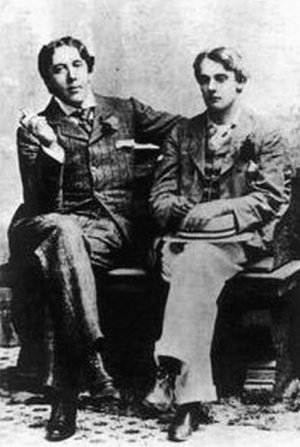One of our staff members is contributing considerably to a News Archiving service at Mu. Any well educated (Masters, PhD or above) users who wish to make comments on news sites, please contact Jim Burton directly rather than using this list, and we can work on maximising view count.
Lord Alfred Douglas

Lord Alfred Bruce Douglas KBE (22 October 1870 – 20 March 1945), nicknamed "Bosie", was the third son of John Sholto Douglas, 9th Marquess of Queensberry, and the former Sibyl Montgomery. He is remembered as a partner to the writer Oscar Wilde, and was an obscure Uranian poet in his own right.
Douglas was born at Ham Hill House in Worcestershire, and educated at Winchester College and Magdalen College, Oxford. He met Oscar Wilde in 1891 and soon began an affair with him. Douglas consented to be the lover of the older man, and shared his interest in younger partners.[1] Of the two, Douglas was known for preferring schoolboys, while Wilde liked older teenagers and young men.[2] In 1894, the Robert Hichens novel The Green Carnation was published. Said to be a roman a clef based on the relationship of Wilde and Douglas, it would be one of the texts used against Wilde during his trials in 1895.
It was a tempestuous relationship. Douglas has been described as spoiled, reckless, insolent and extravagant. He would spend money on boys and gambling and expected Wilde to contribute to his tastes. They often argued and broke up, but would also always reconcile. When Bosie's father, the Marquess of Queensberry, discovered his son's liaison, he publicly insulted Wilde with a misspelled note left at Wilde's club. The note, actually his calling card, had written upon it: "To Oscar Wilde posing as a sodomite."
Wilde charged Queensberry with criminal libel. The confrontation escalated, and some believe Lord Alfred egged Wilde on to fight his father. Wilde was eventually formally accused of 'gross indecency', this being little more than a euphemism for any homosexual act, public or private, an offense for which he went to trial. Wilde was convicted and imprisoned for two years. Afterward, he and Douglas lived together in Naples for three months and then lived apart in Paris for a time.
In 1902, Douglas married Olive Eleanor Custance, an heiress and poet. They had one son, Raymond, who died in 1964. Douglas was the editor of a literary journal, "The Academy," from 1907 to 1910. Douglas published several volumes of poetry (including Collected Poems, 1919; The Complete Poems of Lord Alfred Douglas, 1928; and Sonnets, 1935), some of which is well regarded; two books about his relationship with Wilde, "Oscar Wilde and Myself" (1914; largely ghostwritten by T.W.H. Crosland, the assistant editor of "The Academy") and "Oscar Wilde: A Summing Up" (1940); and an autobiography, The Autobiography of Lord Alfred Douglas (1931).
Douglas's 1892 poem "Two Loves," used against Wilde at the latter's trial, ends with the famous line that refers to homosexuality as "the Love that dare not speak its name".
Douglas translated The Protocols of the Elders of Zion in 1919, amongst the first English language translations of that anti-Semitic work, and embraced right-wing Catholicism in his later life.
Douglas was a plaintiff and defendant in several criminal libel trials. In the most noted case, brought by Winston Churchill in 1923, Douglas was found guilty of libeling Churchill and was sentenced to six months in prison. Douglas had claimed that Churchill had been part of a conspiracy to kill Lord Kitchener, the British Secretary of State for War. Kitchener had died on June 5, 1916, while on a diplomatic mission to Russia. The ship in which he was traveling, the armoured cruiser HMS Hampshire struck a German mine and sank west of the Orkney Islands. Douglas claimed that his health never recovered from his harsh prison ordeal, which included sleeping on a plank bed, without a mattress. While in prison, Douglas, in an ironic echo of Wilde's composition of De Profundis (Latin for "From the Depths") during his incarceration, wrote his last major poetic work, In Excelsis (literally, "in the highest" in Latin), which contains 17 cantos. As the prison authorities would not allow Douglas to take the manuscript with him when he was released, Douglas had to write out the entire work from memory.
This page uses material from the Wikipedia article Lord Alfred Douglas.
See also
References
- ↑ H. Montgomery Hyde, The Love That Dared not Speak its Name; p.144
- ↑ Rictor Norton, A History of Gay Sex "For example, Oscar Wilde’s lover Lord Alfred Douglas preferred to bugger young schoolboys, while Wilde preferred "rough" older lads."
- Official Encyclopedia
- People
- People: British
- People: Artists and Poets
- People: Adult or Minor sexually attracted to or involved with the other
- People: Popular Authors
- People: Historical minor-attracted figures
- History & Events: 19th C
- History & Events: British
- History & Events: Personal Scandals
- History & Events: Real Crime
- Gay